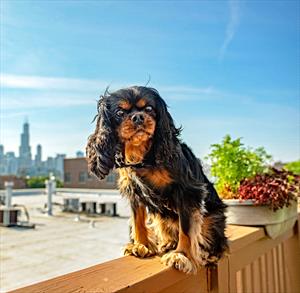 Listen to this story.
Listen to this story.
King Charles

Adobe stock photo
A Norwegian appeals court has upheld a ban on the breeding of cavalier King Charles spaniels, owing to serious health conditions commonly seen in the breed.
A Norwegian appeals court has partly overturned a landmark ruling made earlier this year that had effectively banned the reproduction of two breeds of flat-faced dog in the Nordic country.
In a setback for animal welfare campaigners in what is viewed as an important global test case, Norway's Borgarting Court of Appeal has reversed a ban on the reproduction of English bulldogs, ruling it was an overreach.
At the same time, the appeals court upheld a ban on the breeding of cavalier King Charles spaniels.
The original lawsuit was brought last year by the Norwegian Society for Protection of Animals (NSPA), which opposes the breeding of animals with serious health issues, including those caused by a flattened face, or brachycephaly.
The condition is evident in more than a dozen dog breeds, including bulldogs, pugs and Boston terriers, and found in other types of animals, such as cats, rabbits and horses. The NSPA focused its case on two canine breeds, primarily for practical reasons, as it attempted to set a legal precedent that might apply to other brachycephalic breeds.
Structurally flattened faces are associated with varying degrees of numerous health issues, including difficulty breathing and reproducing, as well as eye, skin and dental problems. Cavalier King Charles spaniels also are susceptible to heart disease and syringomyelia, a progressive neurologic condition characterized by pain in the back of the neck.
In its ruling, the appeals court made specific reference to syringomyelia, which is caused by a mismatch between skull size and brain size, as its reason for upholding the breeding ban on cavalier King Charles spaniels. The condition causes "severe symptoms" and "unnecessary stress and burdens" for affected dogs, the court said in a 59-page judgment dated Nov. 18.
Regarding English bulldogs, the court acknowledged the breed can experience various health conditions, such as brachycephalic obstructive airway syndrome (BOAS). It contended, however, that such health issues are experienced by individual dogs to varying degrees — and could be mitigated by applying "breeding strategies" encouraged by kennel clubs.
Split ruling disappoints both sides
Back in February, the NSPA scored a major victory when the Oslo District Court ruled that breeding either type of dog breached Norway's existing animal welfare legislation.
In the wake of the appeals court ruling, the NSPA gave a mixed response, describing the upheld decision on cavalier King Charles spaniels as a "huge victory for animal welfare." The English bulldog ruling, it said, was a surprise. "This is a breed with a massive disease burden, and where a large proportion of the population suffers from breathing problems."
The NSPA plans to appeal the latest decision in the Supreme Court of Norway, its chief executive, Åshild Roaldset, said in an interview. "A hearing could be denied by the Supreme Court, but if the case is accepted, we will want another evaluation of the English bulldog," she said.
The Norwegian Kennel Club (NKK), which had opposed the lawsuit through the courts, also expressed disappointment, citing the ban on cavalier King Charles spaniels. "The NKK believes that dog breeding must be regulated in relation to individual dogs, not breeds," it said.
Animal welfare advocates had hoped February's ruling would be fully upheld and potentially encourage rule changes in other countries, such as the United States and the United Kingdom.
Dr. Emma Goodman Milne, the founder of Vets Against Brachycephalism, a campaign backed by around 1,600 veterinarians worldwide, expressed dismay over the appeals court decision.
"It's frankly unbelievable that they upheld the cavalier King Charles spaniel decision and not the English bulldog," she said in an interview. "I hope it won't put other countries off pursuing legal action. We certainly need extreme conformation to be viewed as the major cause of unnecessary suffering that it is."
The Kennel Club in the U.K. welcomed Norway's reversal on English bulldogs but said it had "grave concerns" about its decision on cavalier King Charles spaniels. "Our firm belief remains that blanket breeding bans, which fail to distinguish between good and bad breeding, could have a damaging and detrimental impact on dog welfare," Bill Lambert, the club's health, welfare and breeder services executive, said in a press release. The ban on cavalier King Charles spaniels will "simply fuel the unregistered and illegal markets," Lambert said.
Only one other country, the Netherlands, has pledged to enforce anti-brachycephaly laws. Its decision in 2019 prompted the Dutch Kennel Club to become the first such club in the world to end registration of certain brachycephalic breeds — in its case 12, including English bulldogs, French bulldogs, pugs, cavalier King Charles spaniels and Boston terriers, sparking outrage from kennel clubs worldwide.
Update: On Oct. 10, 2023, Norway's Supreme Court upheld the breeding ban on cavalier King Charles spaniels. It also ruled that it was legal to breed English bulldogs in Norway but only under a "specific breeding program" overseen by the Norwegian Kennel Club that seeks to reduce severe cases of BOAS.
The court said its ruling on English bulldogs was based on a present-day assessment and that any subsequent rulings could turn out differently if there is no sufficient improvement in the dogs' welfare in the short term.